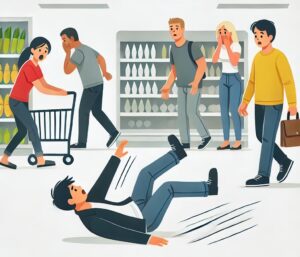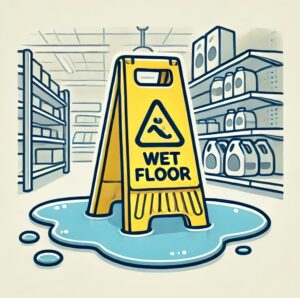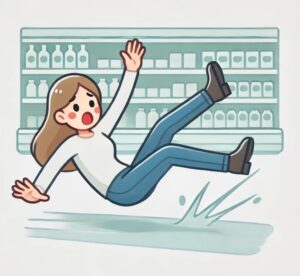 Slip and Falls in Supermarkets and Grocery Stores: What You Should Know
Slip and Falls in Supermarkets and Grocery Stores: What You Should Know
Grocery store slip and fall accidents could leave you with more than just embarrassment. They often cause serious problems, like broken bones, back injuries, and even head trauma.
Supermarkets and grocery stores are among the most frequent places for slip and fall accidents, and as a personal injury lawyer, I’ve helped many of our clients navigate these cases. We’ve dealt with some of the biggest grocery chains in the world, and won.
Recently, we represented someone who damaged her hip replacement when she fell in a grocery store. It caused a lot of damage and long-term medical problems. We were able to get her a six-figure settlement to cover her medical costs, physical therapy, and recovery. But it wasn’t a simple case, and not everyone understands what’s involved.
Here’s what you need to know if you’ve had an accident like this.
Common Causes of Slip and Fall Accidents in Grocery Stores
Grocery stores are filled with potential hazards, and unfortunately, not all of them are well-maintained. Common causes include:
- Spilled liquids or food, including broken jars and faulty refrigerators.
- Recently mopped or polished floors, especially without proper signage.
- Produce aisles, where dropped fruits and vegetables are classic slip hazards.
- Ice melt or condensation, which can leave slick spots near coolers.
- Cluttered aisles, with hazards like stocking carts, boxes, pallets, or loose merchandise.
- Worn or uneven flooring
In addition, in these crowded stores, a fall can cause worse problems than normal. You’re falling at times onto hard concrete floors designed for rolling carts.
Or, as in the case of one client of ours, you can fall into the shelving and hurt your back. It’s an especially dangerous area, even if most of us don’t think of it that way.
 Why Grocery Store Slip and Fall Cases Can Be Complex
Why Grocery Store Slip and Fall Cases Can Be Complex
These sorts of accidents happen far too often. And when they do, the question becomes, “Who pays?”
A lot of people mistakenly believe that slip and fall accidents take advantage of property owners. But in actuality, the system is set up so that whoever is responsible for an accident covers the cost through their insurance.
Even so, figuring out and proving liability in these cases is more complicated than it seems.
Negligence and Liability
First, you’ll need to show how the store was negligent. Did the store employees know about the spill or hazard and fail to clean it up in time? Or was the danger there long enough that they should have known and fixed it?
The store will often argue they regularly inspect the premises and clean hazards as quickly as possible. The key question is whether they did enough.
In addition, the store might claim you were partially at fault—for example, if you weren’t paying attention or ignored warning signs. Often, it’s true that multiple parties play a role in the accident. If you’re partially responsible, you may still be eligible for compensation, although it could be reduced.
Gathering Evidence
You’ll also want to gather evidence to support your claim.
Many grocery stores have security cameras, which could work for or against you. The footage could prove the hazard existed, or it could show you were distracted, or potentially both.
And you should also gather the names and contact info for any possible witnesses who could speak to what happened.
 What Damages Should Be Covered in a Grocery Store Slip and Fall Case?
What Damages Should Be Covered in a Grocery Store Slip and Fall Case?
If you’ve been injured, you could be entitled to compensation for:
- Medical expenses, including emergency room visits, ongoing treatments, surgeries, and rehabilitation.
- Lost wages, if your injury prevents you from working.
- Pain and suffering
- Future medical costs
- Out-of-pocket expenses, which could include transportation costs to doctor’s appointments, prescription medications, and even assistive devices like crutches or wheelchairs.
Even the best slip and fall injury attorney can’t guarantee a certain result. However, your attorney should be able to gather enough information from your initial conversation to talk you through all the possibilities.
How to Choose the Right Attorney for Your Slip and Fall Case
Choosing the right lawyer could be the difference between a successful claim and a denied one.
Look for someone with experience in premises liability cases, and especially slip and falls. You need someone who knows what it takes to deal with big corporations. Even if it happened at a small store, they probably use a large insurance company.
Specifically, look for a lawyer who has successfully handled cases against supermarkets or retail stores. We have extensive experience winning these kinds of cases – and your lawyer should, too.
Your attorney should have the resources to investigate your case thoroughly, including gathering witness statements, maintenance logs, and security camera footage.
And clear communication is essential as well—you want a lawyer who will explain the process clearly and keep you informed at every stage.
 Take Action Quickly on Grocery Store Slip and Fall Accidents
Take Action Quickly on Grocery Store Slip and Fall Accidents
Grocery store slip and fall accidents can leave you with injuries that disrupt your life, but you don’t have to face it alone.
If you’ve fallen in a grocery store, the sooner you speak to an attorney, the better. Evidence can disappear quickly: spills get cleaned, surveillance footage is erased, and witnesses may forget key details. Acting fast means you have the best chance of building a strong case and getting the compensation you deserve.
Our attorneys will fight for you every step of the way. We’ve taken on cases against the biggest grocery chains around, and won. And we don’t make a cent unless and until we win your case, too.
Let our personal injury lawyers handle the legal complexities while you focus on your recovery. If you’ve been injured, reach out today to discuss your options and take the first step toward justice.
Case Inquiry
Yes! I would like to speak with the team at Darrell Castle and Associates.
